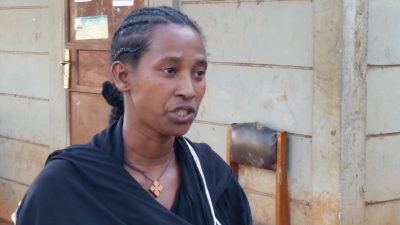Ethiopia’s community-based IRS model increases women’s participation, removing traditional barriers.

Embet Weldesenbet said she did not find the job difficult and that the money she earned meant a lot to her and her son.
Since the late 1950s when the Ethiopian government began using indoor residual spraying (IRS) as part of the WHO-led Global Malaria Eradication Program, the country’s IRS work has been dominated by men. Traditional barriers, such as the misperception that women are not interested in the work or strong enough to do the work required in spray operations and that IRS work is “men’s work,” have limited women from participating in the income-generating work of IRS.
In 2012 – the first year the PMI Africa Indoor Residual Spraying (AIRS) Project implemented a district-based IRS model for spray operations in 36 districts of the country’s Oromia region – women comprised only 23.5% of all people trained by the project. Most of those women were washers, a traditional role for women. With the introduction of community-based IRS, the AIRS project is leveraging this model to increase the participation of women in IRS at the district and community level. The community-based model trains and employs community members to conduct IRS campaigns and allows workers to return to their homes in the evening. Proximity to home and familiarity with the villagers whose homes they are spraying increases women’s opportunities to work with IRS teams.
AIRS now uses district health extension workers, which are almost exclusively women, to serve as squad leaders for each team of four spray operators in community-based spraying. The project is also hiring more women as porters, demonstrating to communities that women can play various roles in IRS.
The AIRS project took the lead in facilitating the discussions and incorporating key gender messages, such as the importance of equal opportunity and respect for women in spray operations. In addition, women who served as spray operators or squad leaders during previous spray campaigns shared their experiences at community meetings and served as role models to other women. The results were impressive with the number of female porters increasing from 12 in 2013 to 98 in 2014, and the number of women in supervisory and management roles who attended IRS trainings nearly doubling from 10 to 19. Overall, in both models women’s participation in IRS campaigns increased to approximately 34 percent.
The personal stories from female IRS implementers coupled with efforts led by the district authorities and the project are helping Ethiopia to narrow the gender gap in IRS and open the door for new income-generating opportunities for women.
This story was taken from www.africairs.net
